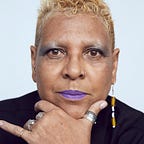Queer Activism in Ghana: An Ongoing Struggle
Anima Adjepong and Shakia Asamoah
Message from Accra — you can support Ghanian activst through their GOFUNDME campaign here.
21 activists have been arrested and held in jail for the last two weeks with bail being refused. But in the midst of all this, we are still attempting to “celebrate” some semblance of int’l gay pride.
Today the court denied the activists bail AGAIN and have sent them to prison for one month while they investigate whether there has been a crime committed. This brings to 3, the number of bail denials.
In the meantime, they are being sent to prison.
Very disheartening. Perhaps we’ve been a bit naive expecting the legal system to work.
Anima Adjepong and Shakia Asamoah provide an expose of Queer activism in Ghana from an historical, and contemporary perspective whilst also placing Ghana’s institutional homophobia/transphobia within a broader continental and global context. They begin with the far reaching consequences of the colonial legacy of criminalizing homosexuality which was adopted by the new independent Republic of Ghana and the role of Christianity in further entrenching anti-LGBTIQ repression and violence. The essay is divided into four sections to be published over this week as part of BLMP’s PRIDE MONTH: A Colonial Legacy; A History of Queer and Trans Organizing in Ghana; The Challenges faced by Queer Organizers; The Global Implications of Anti-Queer Repression in Ghana.
Section 104: A Colonial Legacy
In 1960, Ghana officially became a republic and Kwame Nkrumah became the nation’s first president. The new Republic of Ghana instituted its own set of laws including a criminal code, Act 29. The 1960s criminal code maintained much of the same legislation as the colonial one, streamlining the information and editing the code for clarity. It is reasonable to say that the entirety of Ghana’s criminal code is a colonial legacy. This colonial legacy connects Ghana to St. Lucia and Jamaica specifically, as the original Gold Coast criminal code was modeled on the aforementioned. One key section of Ghana’s Act 29 is 104, a vague law criminalizing something called “unnatural carnal knowledge.” In St. Lucia the offence can be found in Section 133, in Jamaica Section 76, in Bangladesh 377, in Sierra Leone 61. It is important to notice the repetition of this legislative language because it highlights how British colonial ideas legislated sexuality both at home and in the colonies.
Ghana’s law describes “unnatural carnal knowledge [as] sexual intercourse with a person in an unnatural manner or with an animal.” This description raises the question, what constitutes the natural against which unnatural is defined. The vagueness of the law has given cover to heightened and aggressive forms of homophobia and anti-LGBTQ violence. Specifically, those suspected of engaging in so-called unnatural carnal knowledge, perhaps due to their gendered expression or simply because someone does not like them, face threats of legal and social sanction. As written, the law foments an atmosphere ripe for blackmail as sex acts are often conducted in private away from prying eyes. As such accusations of breaking Section 104, particularly part b, which criminalizes consensual same-sex sex, can rarely be proven. Furthermore, the government also uses this law to silence those conducting activism for queer liberation.
Christianity has long been used as justification for the persecution of queer people in Ghana. In the post-independence period, during a time when self-determination was the most urgent national project, Christian leaders once again used Christianity as a basis upon which to exclude queer Ghanaians from emerging concepts of citizenship. In 1966, only nine years after independence, the Christian Conference of Ghana (CCG) established a Committee on Christian Marriage and Family Life (CCMFL) to educate Ghanaian youth about what Church leaders deemed as “proper” sexual behaviors. This committee reinforced Western Christian notions about heterosexual family structures, and monogamy. Although many of these notions were often in contrast to indigenous ideas of gender, sexuality, and family, they were easily adopted into the Ghanaian consciousness about what it means to be both culturally Ghanaian and a citizen of Ghana. A direct link can be traced between the work of the CCMFL in the 1960s to the work of religious leaders in contemporary Ghana.
Colonialism has had an immeasurable impact on how Africans relate to one another and the lasting implications of Section 104 are a prime example. Ghana’s 1992 constitution mandates rights to dignity, equality, and freedom from discrimination for all Ghanaians. However, people whose genders and sexuality fall outside of a Christian heterosexual norm are denied these fundamental rights and denied recognition as culturally Ghanaian or full citizens. Persistent violence and discrimination against same-gender loving and gender expansive (henceforth, queer and trans*) Ghanaians is a lasting colonial legacy. The imposition of Section 104 attempts to legislate away erotic freedoms and delimit the full range of human sexuality in Ghana.
